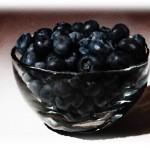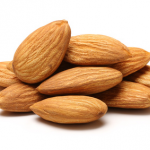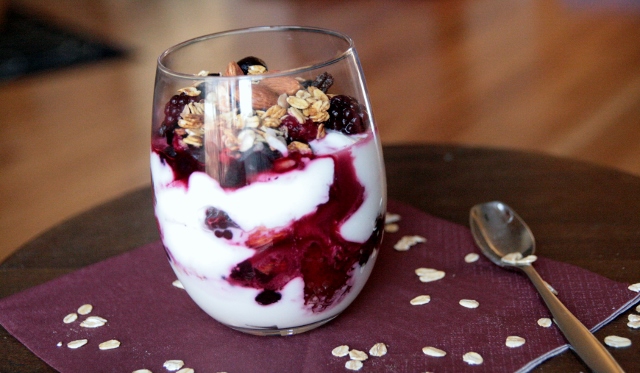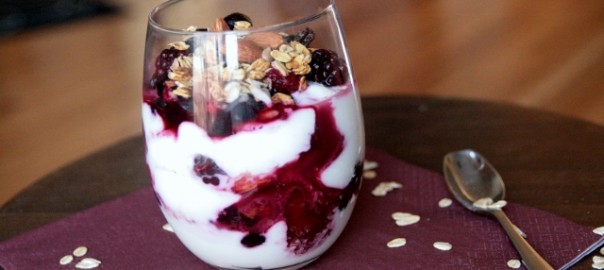This is a fast and easy breakfast, snack, or dessert that is high in protein. I typically use a blend of frozen mixed berries, but fresh berries would be an excellent choice as well. You can prepare this ahead of time so breakfast is waiting for you when you open the fridge. For breakfast on the go, layer it in a small mason jar with a lid.
Why Protein in the Morning? Although most people tend to consume enough total protein in a day, the way they distribute their protein intake isn’t optimal for muscle repair. Your body needs about 20 to 30 grams of protein at a time for muscle building processes: most people don’t consume this amount in the morning, but eat two to three times the amount they need at dinner (and more protein doesn’t build or repair more muscle).
Ingredients
- 1 cup Greek yogurt (plain – I use nonfat, but other varieties will work)
- 1 cup mixed berries (thawed if from frozen)
- Whole almonds (about 10)
- 1/4 cup oats, granola, or other whole grain cereal
Makes ONE Serving.
Directions
You can put this together a variety of ways. It looks great layered in a glass cup or bowl.
Variations
- This breakfast lends itself to endless variations. If this is for dessert and you want something more decadent, use a creamier vanilla yogurt or layer in a bit of maple syrup on top of the yogurt.
- Any kind of nut will do. Toast them for maximum crunch and flavor.
- If you don’t have berries on hand, this works well with just about any fruit.
Nutrition Notes
- Greek yogurt is exceptionally rich in protein and calcium, so a great way to start the day (most people don’t eat enough protein in the morning). High yogurt consumption (> 7 servings/week) is linked to lower weight (especially in people who eat more fruit), and lower risk of diabetes.
 Berries are one of the most nutritious fruit: they are rich in vitamin C, fiber, folate, and potassium. They also rank higher in antioxidant power than most fruits and vegetables. Berries also contain anthocyanin, a phytochemical that helps fight oxidative cell damage that can lead to chronic diseases including cancer, diabetes, and heart disease.
Berries are one of the most nutritious fruit: they are rich in vitamin C, fiber, folate, and potassium. They also rank higher in antioxidant power than most fruits and vegetables. Berries also contain anthocyanin, a phytochemical that helps fight oxidative cell damage that can lead to chronic diseases including cancer, diabetes, and heart disease. Almonds are a great source of healthy monounsaturated and polyunsaturated fats, fiber, Vitamin E and important minerals (notably magnesium). Like other nuts, they can lowers LDL (“bad” cholesterol), and increase HDL (“good” cholesterol), and help lower blood pressure. A recent study suggests eating nuts daily might help you live longer and improve your health. Regular almond consumption can improve blood flow, increase blood levels of antioxidants, and lower blood pressure. Like other nuts, almonds are high in calories (50 g of almonds have about 290 calories), but that might not be a great concern for those who don’t need the extra calories: another just-published study showed that eating almonds as snacks for 1 month suppressed hunger and desire to eat sensations and didn’t affect body weight. Read about the latest studies on almonds and health (Experimental Biology, April 2014) here.
Almonds are a great source of healthy monounsaturated and polyunsaturated fats, fiber, Vitamin E and important minerals (notably magnesium). Like other nuts, they can lowers LDL (“bad” cholesterol), and increase HDL (“good” cholesterol), and help lower blood pressure. A recent study suggests eating nuts daily might help you live longer and improve your health. Regular almond consumption can improve blood flow, increase blood levels of antioxidants, and lower blood pressure. Like other nuts, almonds are high in calories (50 g of almonds have about 290 calories), but that might not be a great concern for those who don’t need the extra calories: another just-published study showed that eating almonds as snacks for 1 month suppressed hunger and desire to eat sensations and didn’t affect body weight. Read about the latest studies on almonds and health (Experimental Biology, April 2014) here.
Nutrition Per Serving
- 350 calories
- 29 g protein
- 7 g fat
- 0 mg cholesterol
- 42 g carbohydrate
- 6 g fiber
- 120 mg sodium
- 200 mg potassium
- Iron: 12 % Daily Value
- Calcium: 30 % Daily Value
Watch me make the berry parfait and talk about recipes for runners on CTV Morning Live.
More Breakfast Recipes
- Simple Peanut Maple Granola
- Mixed Berry Yogurt with Almonds
- Baked Mediterranean Frittata
- Traditional Swiss Oat Muesli
You’ll find more healthy recipes here.
____________
Reviewed and updated July 7, 2014
Yum





 Based on 22 Review(s)
Based on 22 Review(s)
